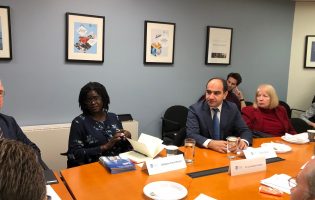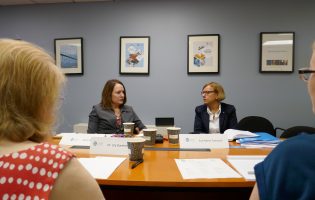
How Much Can Education Serve as a Mechanism for the Integration of Minorities and Immigrants?
Experiences from Germany and the United States In both the United States and Germany education is key for the successful integration of society and an acceptance of diversity. Diversity education, …

Rainbow Politics: Comparing LGBT+ Rights in Germany and the United States
On October 1, 2017, Karl Kreile and Bodo Mende exchanged vows at the town hall in Schöneberg—the first same-sex couple married in Germany. More than two years earlier, the United …

The Radicalization of the Extreme Right
The Rallies in Charlottesville in August 2017 and Chemnitz in August 2018 In August 2017, members of multiple far-right movements rallied in Charlottesville, Virginia, with the goals of uniting the …

Mothers: Remembering Three Women on the 80th Anniversary of Kristallnacht
Ida was terrified. She figured she would never see either her husband or brother ever again. For several days she fretted, not knowing what to do. While desperately trying to …
Recent Authors
AGI provides knowledge, insights, and networks as tools to solve the challenges ahead.
Support Our WorkHajo Funke, DAAD/AGI Research Fellow
AGI is pleased to welcome Prof. Dr. Hajo Funke as a DAAD/AGI Research Fellow from October to December 2018. Prof. Dr. Hajo Funke is a DAAD/AGI Research Fellow from October to …

Workforce Integration of Immigrants in the United States and Germany
Local and Religious Perspectives As immigrants and refugees arrive in both the U.S. and Germany, they must quickly navigate new bureaucracies, languages, and workforces. Religious institutions and organizations are key …
Ufuk Topkara, DAAD/AGI Research Fellow
AGI is pleased to welcome Ufuk Topkara as a DAAD/AGI Research Fellow from October to December 2018. He has been active in promoting inter-religious dialogue since 2005 as an expert on …
Volker Rein, DAAD/AGI Research Fellow
AGI is pleased to welcome Volker Rein as a DAAD/AGI Research Fellow in October and November 2018. Dr. Rein is an experienced social scientist specialized on developments in education and …

A Democratic Response to Digital Disinformation: The Role of Civil Society
Numerous factors complicate efforts to combat digital disinformation, not the least of which is the near impossibility of establishing a universal set of standards that could define what is and …






